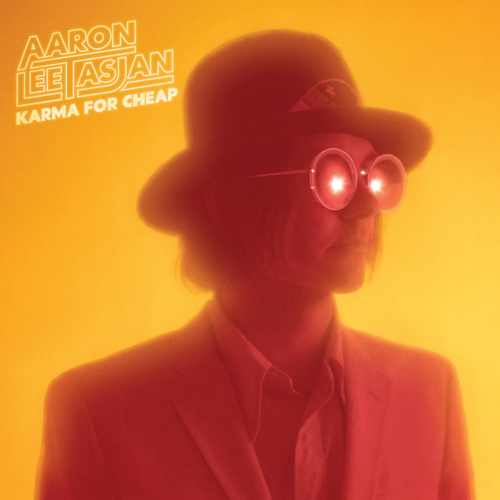
The dream of universally appealing, content-free rock music has never thrived in Nashville, where the pull of narrative has always been strong. Music City songwriters like to tell stories about basic human interactions, but there has long been an absurdist, formalist streak in rock that trades sincerity for send-up. See Nick Lowe’s “Nutted by Reality” — is it a “sincere” song about the problems of Cuba and Castro, or is it a send-up of the idea of waxing wounded about such matters in a pop song?
Creating pop that defies notions of significance requires nerves of steel and a refined sense of humor, and Nashville singer, songwriter and guitarist Aaron Lee Tasjan pulls off this trick brilliantly on his new full-length Karma for Cheap. There’s not a wasted second on it. Tasjan creates what may be the greatest power-pop record ever cut in Nashville, and his lyrics mimic meaningfulness in ways that evoke the work of the greatest rock absurdists.
Karma for Cheap is a breakthrough record for the Ohio-born Tasjan, who cut a couple of well-received albums after moving to Nashville from Brooklyn in October 2013. On 2015’s In the Blazes and 2016’s Silver Tears, Tasjan filtered country-rock through an East Nashville sensibility. Karma for Cheap is more focused than his previous work. In his new songs, Tasjan uses the vocabulary of Beatles-derived music as it was practiced circa 1972. Karma for Cheap suggests one possible future for pop in a music town that’s bursting at the seams with new ideas.
“In a lot of ways it’s helped me to be more myself,” Tasjan tells the Scene about living in Nashville. “When I first got to town and I made In the Blazes, I really wanted to try to make a record that would fit in with what was going on in town at the time. I was walking into a place where all these musicians had already been doing this kind of country-rock music for a long time.”
On his first two records, Tasjan wrote tongue-in-cheek variations on the country-rock practiced by Nashville performers like Elizabeth Cook, whom he name-checks on the In the Blazes track “Florida Man.” Tasjan proved a first-rate exponent of fake country-rock on “Florida Man,” which displays his formal savvy. On another In the Blazes track, “E.N.S.A.A.T.,” or “East Nashville Song About a Train,” he sent up the idea of East Nashville music by comparing the integrity of Hank Williams to the pretensions of lesser imitators, who write songs about trains on the hip side of the Cumberland River: “Well, you can’t turn away from your own two feet / Or give away what’s not yours to keep,” he sings.

Listening to Tasjan’s first two albums, you perceive a playful approach to his subject matter that isn’t satirical, despite his jabs at musical impostors in “E.N.S.A.A.T.” He perfects this approach on Karma for Cheap, which takes a dig at sententious speech — and, quite pleasurably, ends up saying nothing about big subjects like fame, truth and the nature of inspiration. As Tasjan seems to have figured out, it’s difficult to write about such large topics without resorting to stock phrases, and Karma for Cheap is an elegantly constructed essay on the art of not taking serious things too seriously. Tasjan casts a formalist’s eye on the very idea of sincere pop songs, but Karma for Cheap is as warm and cozy as an electric blanket. Tasjan’s lyrics simulate emotions, but his playfulness never feels like posturing.
Karma for Cheap traffics in the uncanny and the evocative, as in “Heart Slows Down,” which finds Tasjan quoting a line from Thunderclap Newman’s Speedy Keen-written 1969 hit “Something in the Air,” a song about the impossibility of revolution in modern society.
“The place that came from is a fuzzy childhood memory,” says Tasjan. “I used to go to sleep every night to Tom Petty and the Heartbreakers’ Greatest Hits record. It was what I would fall asleep to every night when I was a kid. The very last song on that record is a cover of that Thunderclap Newman song.”
Elsewhere on Karma for Cheap, Tasjan proves his mastery of post-Beatles rock. He frames the record’s opener, “If Not Now When,” with licks straight out of the George Harrison-Badfinger-Chris Bell handbook. He also pulls off an acoustic ballad, “Dream Dreamer,” a virtuosic display of songwriting and guitar playing. Instead of opting for a standard folk-country form with repeating sections, Tasjan turns “Dream Dreamer” into a through-composed song that flows naturally through a series of sophisticated harmonic turns.
Karma for Cheap is so rich and detailed that it’s possible to become addicted to it, which makes it an exemplary power-pop record. Tasjan’s lyrics are, for the most, part, catchphrases masquerading as wisdom, but the record is not just catchy, it’s wholesome. If pop this great is the price of disregarding the significance we think we need in music, maybe it’s time to rethink what’s really important.






